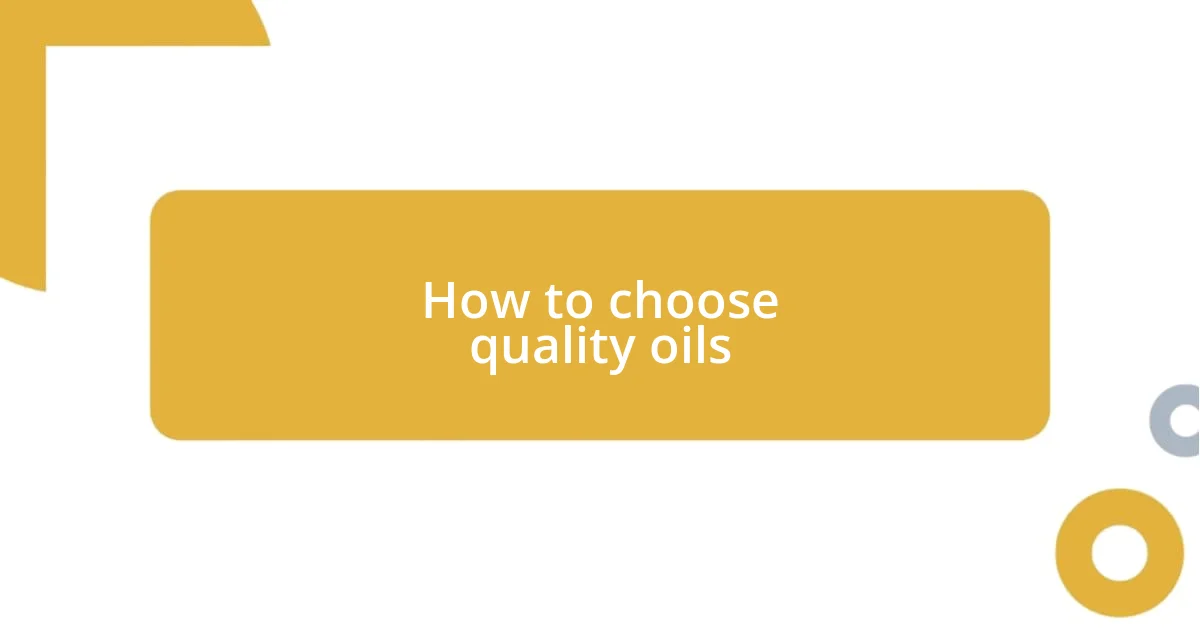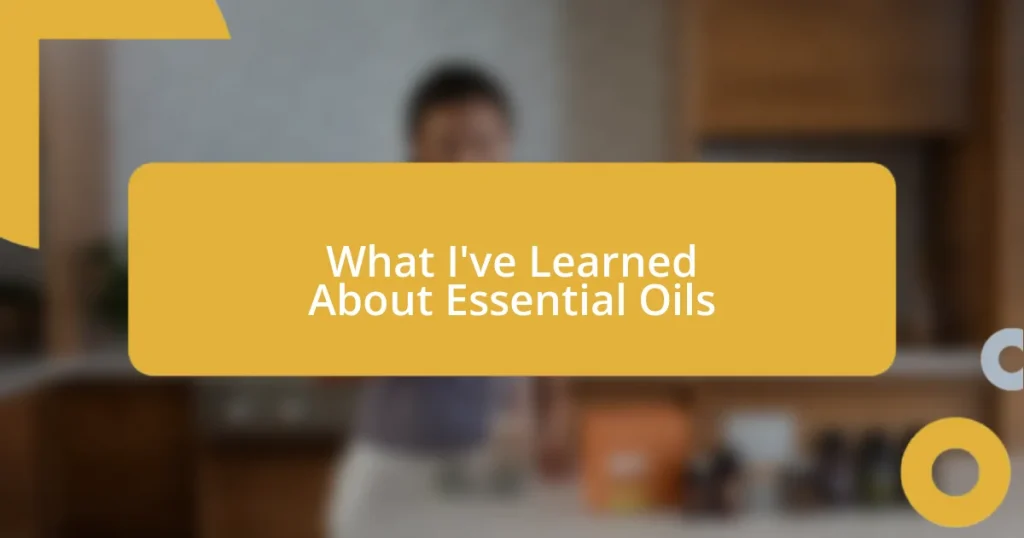Key takeaways:
- Essential oils can enhance mood, provide physical benefits, and be used in versatile applications, such as aromatherapy, topical use, and cleaning.
- Choosing quality essential oils involves checking for purity, avoiding synthetic additives, and being aware of sourcing and testing practices.
- Safety precautions are crucial, including diluting oils before skin application, being cautious about ingestion, and conducting patch tests for allergens.

Understanding essential oils benefits
Essential oils have a remarkable ability to impact mood and well-being. I distinctly remember a time when I was feeling particularly overwhelmed with stress. A few drops of lavender oil in my diffuser transformed the atmosphere in my home, creating a calming oasis that I desperately needed. Have you ever noticed how certain scents can effortlessly shift your mental state?
Beyond just emotional support, essential oils offer a spectrum of physical benefits too. For instance, tea tree oil is renowned for its antimicrobial properties. I’ve relied on it during bouts of skin flare-ups, and it never ceases to amaze me how quickly it works. Doesn’t it feel empowering to have natural remedies on hand that can aid in both wellness and comfort?
Moreover, the versatility of essential oils is hard to overstate. I often blend oils like peppermint and eucalyptus for a refreshing boost while exercising. The invigorating scents seem to enhance my performance, making every workout feel a little more bearable. Have you found yourself reaching for essential oils in moments where you need an extra push? Their benefits are truly multi-dimensional, influencing mind, body, and spirit in beautiful ways.

Types of essential oils
Essential oils can be broadly categorized into several types, each offering unique properties and uses. For instance, citrus oils like lemon and orange bring a vibrant, uplifting scent that can energize your space. I recall a morning when I felt sluggish and poured a few drops of lemon essential oil into my diffuser. The zesty aroma not only brightened my mood but also inspired me to tackle the day ahead. Have you ever tried citrus oils to kickstart your mornings?
On the other hand, we have floral essential oils like rose and ylang-ylang. These oils are often associated with relaxation and romantic vibes. I remember using ylang-ylang oil during a spa day at home; its sweet, rich scent transformed my bathroom into a serene sanctuary. There’s something about floral scents that can wrap you in comfort and calm. Do you have any favorite floral oils that you find soothing?
Lastly, herbal oils such as rosemary and sage can help with focus and clarity. I’ve often used rosemary oil while studying or working on a challenging project, and I genuinely believe it enhances my concentration. The earthy aroma stimulates my brain, making it easier to immerse myself in tasks. What oils do you lean on for mental clarity? It’s fascinating how different essential oils resonate with our individual needs.
| Type of Essential Oil | Common uses |
|---|---|
| Citrus | Uplifting, energizing, used for mood enhancement |
| Floral | Relaxation, comfort, often used for stress relief |
| Herbal | Focus, clarity, commonly used to boost concentration |

How to choose quality oils
Choosing quality essential oils can be quite an adventure. I’ve learned the hard way that not all oils are created equal. My first experience with a less-than-pure oil left me disappointed, as the scent was weak and didn’t provide the benefits I expected. Now, I always check for purity and sourcing information before I buy.
Here are some key factors to consider when selecting quality essential oils:
- Look for 100% Pure Oils: Ensure the label states “100% pure” and avoid those with synthetic additives.
- Check for Scientific Names: High-quality oils include the scientific name of the plant. This helps confirm authenticity.
- Investigate Sourcing: Reputable brands indicate where the plant materials come from. I always prefer oils sourced from regions known for their quality.
- Consider Third-Party Testing: Brands that provide test results show their commitment to quality. I find peace of mind knowing my oils have been evaluated.
- Smell Before You Buy: I recommend smelling the oil if possible. A genuine oil should have a strong, distinctive scent that reflects the plant it comes from.
These tips have guided me in making better choices, turning my essential oil journey into one filled with joy and satisfaction.

Methods of using essential oils
Using essential oils can be both an art and a science, and there are several effective methods to integrate them into your daily routine. One of my favorite ways is aromatherapy, where I simply add a few drops of my preferred oil to a diffuser. I remember one evening when I layered lavender and chamomile in my diffuser; the calming scent enveloped the room and transformed my anxiety into tranquility. Have you thought about how different scents affect your mood?
Another popular method is topical application, where I blend essential oils with a carrier oil, like coconut oil, before applying it to my skin. For instance, after a long workout, I often mix a few drops of peppermint essential oil into a carrier. The cooling sensation not only soothes my sore muscles but also elevates my spirits. Do you opt for topical applications to enjoy the benefits of essential oils?
Lastly, incorporating essential oils into my cleaning regimen has been a surprising joy. I’ve swapped out commercial cleaners for a concoction of tea tree and lemon oil mixed with vinegar. Not only does my home smell fresh and inviting, but I also feel good knowing I’m using natural ingredients. Have you experimented with essential oils in your household tasks? It’s amazing how these oils can transform not just our well-being, but also our living spaces.

Safety precautions with essential oils
When it comes to using essential oils, safety should always be a top priority. I’ve learned the hard way that applying undiluted oils directly to the skin can lead to burns or irritation. I once got a strong reaction from a cinnamon oil I was eager to try. Since then, I never skip diluting my oils in a carrier oil like jojoba or almond before applying them. Are you aware of the importance of dilution?
It’s also vital to be cautious about ingesting essential oils. While some oils can be safe for internal use, my experience has taught me that this isn’t something to approach lightly. I remember reading about people who suffered digestive issues after consuming oils without the guidance of a knowledgeable practitioner. When in doubt, it’s always safer to stick to inhalation or topical application methods. Have you ever stopped to consider the implications of ingesting these potent substances?
Lastly, I advise being mindful of allergens. Some oils can trigger allergic reactions, and I’ve encountered friends who learned this the hard way. Imagine planning a relaxing evening with friends, only to have someone break out in hives from a lavender-infused balm. I always recommend doing a patch test, applying a small diluted amount to an inconspicuous area of skin, and waiting 24 hours before full use. That simple precaution could save you from potential discomfort. How many precautions do you take when exploring the world of essential oils?

Common misconceptions about essential oils
It’s fascinating how many people assume that all essential oils are safe and effective for every purpose. I used to think that because lavender is widely praised for relaxation, I could use it for anything, but I learned the hard way that not every oil reacts well to every individual. I once blended several different oils without doing proper research, and what was supposed to be a calming experience turned into a headache instead. Have you ever overlooked the specific properties of a particular oil?
Another common misconception I’ve encountered is the idea that essential oils can completely replace medical treatments. While they do offer wonderful support for wellness—like how eucalyptus helped ease my sinus congestion—I’ve recognized their limitations. I remember chatting with a friend who thought her essential oil blend could cure her persistent cold. It’s essential to remember that these oils should complement, not replace, traditional medical advice. Have you considered how to effectively integrate natural remedies with your healthcare routine?
Lastly, there’s this belief that all essential oils are created equal. I initially thought grabbing a bottle on sale meant I was getting a good deal, but then I discovered there’s a significant difference in quality and purity. When I first tried an off-brand peppermint oil, it failed to deliver the energizing effect I was hoping for. It taught me the importance of researching reputable brands. Isn’t it worth investing in high-quality oils to ensure you’re truly getting the benefits?















